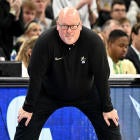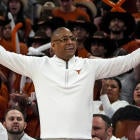
CBS Sports' Gary Parrish and Matt Norlander surveyed roughly 100 coaches for our annual Candid Coaches series. They polled everyone from head coaches at elite programs to assistants at small Division I schools. In exchange for complete anonymity, these coaches provided unfiltered honesty about a number of topics. This is our final week of posting the results of our summer survey on the state of college basketball.
Earlier this offseason, sources told CBS Sports that SEC commissioner Greg Sankey had been vocal in meetings with major college sports stakeholders over his willingness to consider changing the NCAA Tournament. This was confirmed in August, when Sankey went on the record (albeit with language that was equal parts understated and vague) with Sports Illustrated.
"Just take a fresh look at all of it," Sankey told SI. "As we think collectively, everyone goes to the corner and says, 'I have to hang on to what's mine.' But how do we contribute and build it better together?"
Sankey's words carry significant weight because, aside from running the almighty SEC, he is also co-chair of the Division I Transformation Committee. That commission is 21 people deep and has the ambitious duty of outlining and helping administer an overall restructuring of NCAA athletics as we know it, tectonic-like changes that are scheduled to materialize in the near future.
What the SI story did not include was Sankey referencing an inflammatory detail that sources shared with CBS Sports earlier this summer: in one meeting with high-ranking NCAA officials, Sankey postulated over the idea that the NCAA Tournament(s) in basketball deserve at least a cursory look at a format without automatic bids -- or at the very least, a marked reduction of them.
It's an idea ripe for everlasting wrath from college basketball fans. The NCAA Tournament is nearly perfect, and Sankey would become public enemy No. 1 in basketball if he led a charge to remodel one of the best sporting events in the world. But what do coaches think about the potential to reshape March Madness?
Should the NCAA Tournament stay as is or change to a 68-team, all at-large format?
| Stay as is | 97% |
| All at-larges | 3% |
Quotes that stood out
Stay as is
• "NCAA Tournament format should never change when it comes to the automatic bids."
• "Need the auto bids and upsets. Think you lose the casual fan if it's all the big boys only, along with the spirit of the tournament."
• "Obviously as a mid-major coach I'm very concerned about the NCAA Tournament and the talk of getting rid of the automatic bids. To me this tournament is the greatest sporting event in the United States, even better than the Super Bowl because it lasts for three weeks. The aura, or what makes this tournament so special, is the ability of mid-majors to win some games. I really believe you can't take that away because you're chasing money. At some point the money chasing has to stop and the history of the game has to be preserved."
• "Absolutely remain the same. While I am not one that believes the NCAA Tournament would collapse if it went Power Six only, I do think there would be a material drop in the excitement surrounding the tournament -- viewers, brackets filled out, general interest. This in turn will have an impact on viewership and therefore advertising dollars. All of this will make the impact of the tournament less of an annual event nationally."
• "If it ain't broke, don't fix it. And if it's amazing, definitely don't fix it. REMAIN AS IS."
" NCAA Tournament should remain as is. The teams that have legit national championship abilities will be in the tournament no matter what. If you go all at-large bids, you lose some amazing storylines (Saint Peter's), and in my opinion lose some of the entertainment value of Cinderella teams, storylines of players not often seen and opportunity to truly help the universities. When UMBC upset Virginia, the school's server crashed because of the amount of traffic on the website."
• "Don't mess with the NCAA Tournament. Championship week and the Cinderella teams are what has made the sport as popular as it is. The at-large process is already skewed heavily toward the big boys, so it's virtually impossible for mids to get at-large bids."
• "The NCAA Tournament thrives because of the Cinderellas ... it brings great school spirit for all 68 teams involved, whether enrollment is 1,200 or 28,000 students."
• "I like Greg Sankey, but at that point there's so much politics there it's like, what are we doing? It's jumping from the frying pan to the fire."
• "If [Sankey] does that, March Madness the way we've known it won't be the same and overall we'll lose interest. Our fan base doesn't give a shit about UConn losing to Oklahoma in the first round. The run Saint Peter's made was historical. They love that. Loyola Chicago, they love those stories. That makes March Madness March Madness. If they change that, they better start paying the athletes a salary because you pretty much have farm league teams. College would turn into G League. And then what's next for mid-majors? A 'mid-major national championship'?"
• "It takes away the magic of the tournament. The thing that makes it special is you have the Butlers, the VCUs, the Saint Peter's. That's what makes the tournament special. The upsets on any given night, an inferior team can win and that is what makes the NCAA Tournament most special, most watched, just incredible sporting event."
• "The tournament is the best event in all of sports. Zero change is necessary to March Madness."
All at-larges
• "Remove auto bids -- best 68 go. [The current format] puts a lot of teams in tourney that shouldn't be in there. Also places too much significance on three days at our (mid-major) level that takes away from entire regular season. I'm sure there are a lot of traditionalists that will say this will ruin the tourney but that's not accurate. It will create best first round matchups and only increase the quality of the tourney. Let's get the best 68 teams in."
• "Change it. No automatic bids. Find the best 68 teams and let's play. From a coaching standpoint too many guys -- who do a great job -- are being fired from one-bid-league jobs whenever they don't make the tournament in their first four years. Also I would rather see a 1 vs. 16 game of Duke vs. Stanford as opposed to a Duke vs. Bryant or Houston Baptist, with all due respect."

The takeaway
OK. Really hot topic here. Magma-like for some, based on my conversations. This is the greatest discrepancy in voting for any poll question in the 10-year history of our Candid Coaches series. I don't think you can get a 97% return from coaches on any other issue in this sport -- including whether or not they believe they're paid enough.
We asked guys from more than two dozen leagues. From head coaches of top-10 programs to young assistants in far-off one-bid conferences, almost all of them agree: College basketball has a postseason that should not be tampered with.
Ninety-seven percent.
Are you listening, Greg Sankey?
You'll notice we didn't ask whether or not the tournament should be expanded. The reason that wasn't part of this question was because my initial tip on Sankey's talking about didn't explicitly indicate expansion was a mandatory appendage to the idea that 32 automatic bids might go away. I began surveying coaches back in late July and then Sankey went public in mid-August, admitting growing the tournament was one possible modification he'd be open to discussing.
If you're a staunch anti-expansionist, I can report that, while there were a handful of coaches who suggested going to 72 or 80 or 96 teams while discussing this poll question, plenty of others (and many of them under the age of 50) were vocally supportive of not watering down the NCAA Tournament by growing beyond 68. The more teams you let in, the less relevant and less urgent college basketball's regular season becomes, and it seems like more coaches are hip to that situation with the sport on a national level than ever before.
"Stay as is," a coach of a recent Final Four team said. "There's something magical about our sport being the only sport where everyone can win the natty on Day One of practice."
"We're already generating a billion dollars," a Pac-12 coach told me. "Do you want to generate $1.2 billion? I guess you can do whatever you want."
Another coach had this idea, which is worth exploring: "The NCAA Tournament should stay as is and the NIT should grow to 64 teams. The problem is there's really good teams staying at home because they're not high-major. You've got teams with 21-24 wins that might be playing in the CBI."
The topic of tournament expansion is sure to be met with aggressive pushback, should the conversation ever get there. The NCAA's contract with CBS and Turner goes until 2032. Sources said that any changes to the size of the tournament before then wouldn't be impossible, but still a major undertaking. This is a complex issue that also has ties to the notion of D-I basketball governing itself, which would give it the power to restructure its own basketball postseason. But something like that can't be done until the contract ends, sources said -- a tidbit that was also shared by ACC commissioner Jim Phillips to ACC coaches this summer, sources added.
For as much consternation as this topic has in NCAA circles right now, it's worth emphasizing that the transformation committee hasn't even decided whether or not to truly consider doing anything with the NCAA Tournament. That's a vital detail. (For now.) In speaking with sources earlier in September, it was emphasized to me that, at this stage, the NCAA Tournament has not been broached on any legitimate level (in terms of would-be proposals) about changing its structure.
However, before it can get to that point, thought experiments need to be had and informal discussions help set the table. Those discussions have been perfunctory at this stage. Is this how you slowly make a change -- a small change -- that becomes something bigger, something potentially damaging? That's the perpetual fear.
Every mid-major commissioner would obviously object to the idea of getting rid of any automatic bids. In my estimation, based on previous conversations, many would similarly reject NCAA Tournament expansion. One commissioner who falls in that category is the MAAC's Rich Ensor, the longest-tenured commissioner in the history of the NCAA. He's retiring next year. He also happens to be longtime friends with Sankey. Ensor went on record recently and said he doesn't think Sankey actually wants to be the agent of change for March Madness.
"He says things like that because he's got people he's got to deal with," Ensor told the Asbury Park Press. "He doesn't want to mess with the basketball tournament."
A positive development there. Still, an eventual function of Sankey's transformation committee will be a full-on audit and evaluation of the men's and women's basketball tournaments to determine if the situations are satisfying as is or if there should be a rework. Perhaps Sankey said what he said earlier this offseason knowing that it would leak out, to use it as a trial balloon.
If so, that balloon was viciously popped here.
More than a decade ago there were serious discussion about bloating the tournament to 96 teams. The blowback was fierce and NCAA brass understood it was not something the American public craved. They also understood that it would make a joke out of basketball's regular season. Out of that thought experiment came a compromise: an increase from 65 to 68 teams. It's not as symmetrically perfect as 64, but it still works magnificently. Bigger means better for the College Football Playoff -- a much more practical four-to-12 expansion effort Sankey also literally helped build in the past couple of years. That's not the case for college basketball, which trades off the somewhat-expendable nature of its regular season for the irreplaceable charm, magic and month-long domination that is March Madness.
The tournament needs no expansion and it sure as hell doesn't need to take away the underdog element, not when Saint Peter's just pulled off maybe the best Cinderella run in history. Not when Loyola Chicago needed an automatic bid in 2018 en route to a fairytale Final Four. Not when it gave us No. 16 UMBC over No. 1 Virginia. There's 15-seeds Oral Roberts and Florida Gulf Coast (remember Dunk City?) and Coppin State. The tournament's lore was built in no small part by outcomes like Princeton over reigning national champion UCLA in 1996, Weber State over mighty North Carolina in 1999, Ron Hunter falling off his stool after his son hits a 3-pointer to lift No. 14 Georgia State over Baylor in 2015.
The one huge thing college basketball can make a legitimate claim to is that it has the greatest and grandest postseason in the United States. It didn't get to that point because of seventh-place ACC teams squeezing in or the sixth-best Big Ten team limping to a 10-seed. It got there because of its David vs. Goliath appeal and because the viewing format for the opening weekend is nirvana.
Leave it alone. There are so many things in college athletics that require immediate fixing. For the love of George Mason, the NCAA Tournament is not one of them.





















